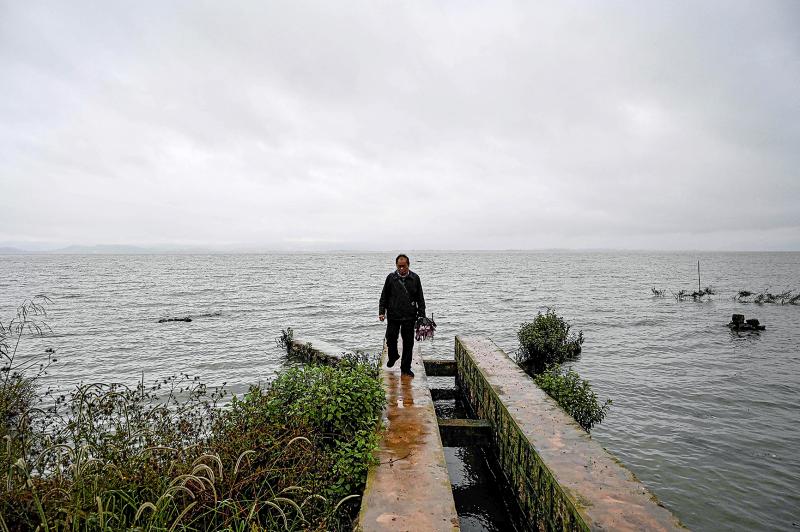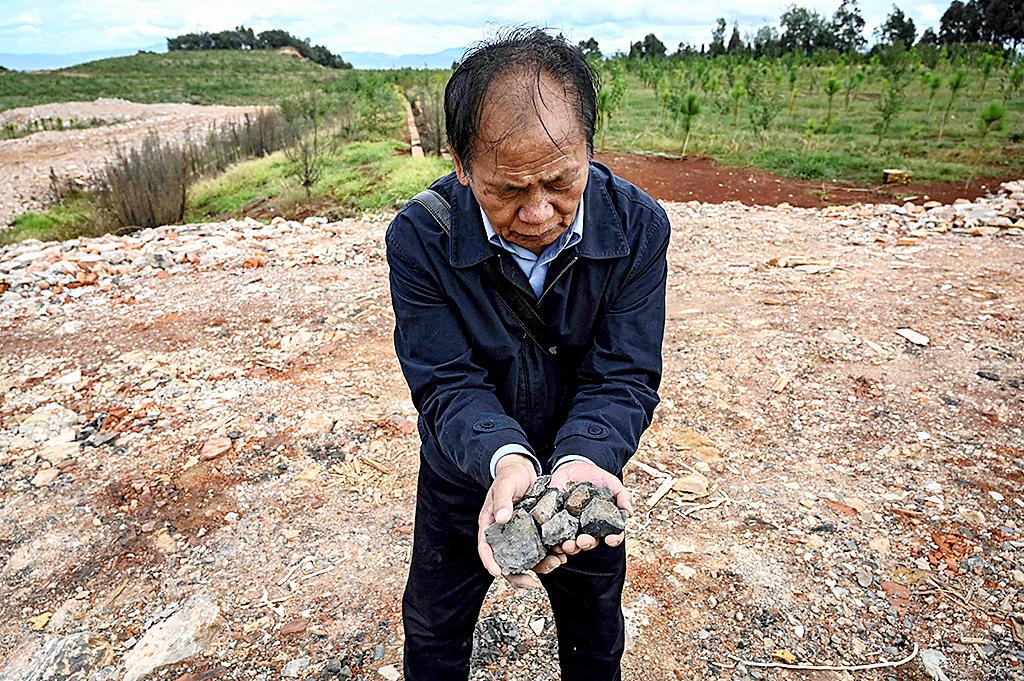Environmental activist Zhang Zhengxiang is almost blind, and lives in poverty — but he has successfully faced down hundreds of companies on the banks of one of China’s most polluted lakes.
The 74-year-old strident campaigner has spent his life trying to protect the sprawling Lake Dian in southwestern China, challenging businesses to clean up their act around the local beauty spot and reporting those who pollute it.
“When I was a child, we could see the bottom of the lake. When I was thirsty, I drank the water from the lake — we used it for cooking,” he said.

Photo: AFP
“The water has become poison. We can’t drink it, use it or even touch it.”
It can be risky work. In China grassroots social movements are heavily suppressed by the government, and environmental activists and the lawyers that represent them have in the past faced stiff reprisals and even jail terms.
Zhang says he has been attacked by disgruntled businesses, but is undeterred. Several times a week, he patrols the red-soil banks with binoculars in search of polluters, snapping pictures on a small compact camera.

Photo: AFP
One of China’s largest freshwater lakes, the vast expanse of water nestles the city of Kunming, which recently hosted an international biodiversity conference. But decades of agricultural, industrial, mining and human waste are destroying it. Beijing has invested more than 50 billion yuan (US$7.8 billion) to protect the lake, building dozens of treatment plants and diverting a river to supply it with fresh water. But the surface of the water is still cloudy, and covered with green algae.
DUTY TO DEFEND
Zhang was born in a village by the water’s shore and spent years living off the lake, eating its fish and fruits from the surrounding forest.
His father died when he was five, and his mother left shortly afterwards, leaving him and his two siblings to fend for themselves. His younger brothers died during the years of China’s devastating famine, leaving Zhang entirely alone and living in the wild, learning to forage to survive.
“The lake is a living being, but it has no voice in the story. It is my duty to defend it”, he said. “(The lake) is my second mother.”
China’s decades of breakneck growth saw industrialists flock to the region’s rich mining soil and natural resources.
But the influx caused huge pollution.
Zhang started to denounce polluting companies who exploited resources or built without permission — often facing an uphill struggle to reach sympathetic ears.
Local officials simply haven’t done enough to protect the local environment, he says.
“Why? Because they had collaborated with these enterprises,” he said.
Zhang’s lakeside house is packed floor-to-ceiling with papers and reports about his work.
Businessman Zhou Guangwen’s quarry closed nearly two decades ago after Zhang reported it to the authorities.
But the two men are close friends, and Zhou says although he lost all the money he invested in the mine, he now has sympathy for Zhang’s environmental efforts.
Zhang claims he has brought about the closure of more than 200 factories — but it has all taken a toll.
“Local executives, the owners of mines and quarries whom he denounced... many people hate him,” added Zhou.
STEEL TIGER
In 2002, the activist was badly injured when hit by an unlicensed truck while gathering evidence about an illegal quarry.
Zhang believes the collision — which left him partially blind and broke his arm — was deliberate.
He says he has suffered other attacks over the years.
“They beat me, hurt me, tore down my house and grabbed my farmland,” he said.
“I’m not afraid. They are paper tigers and I am a steel tiger.”
Environmental campaigners in China must walk a fine line or risk the wrath of local officials and businesses. Teenage campaigner Howey Ou braved years of intimidation, including being kicked out of school, before leaving the country to lobby from abroad. Zhang, who was lauded a “true ambassador of the environment” on the national TV show Inspiring China, says he is finally being listened to.
In May, a giant real estate project on the lake’s eastern shore was declared illegal.
And a former deputy mayor who held responsibility for tackling water pollution was placed under investigation last month.
“We have seen a turning point in water pollution in China since the mid-2000s,” said Chinese environmentalist Ma Jun.
Two decades ago, a quarter of national water monitoring stations reported water quality worse than the lowest grade.
“From that time, thanks to concerted efforts, this has dropped to less than one percent in 2020,” Ma said.
But a plan to divert fresh water to Lake Dian from the Yangtze river 400km away will take years to complete.
And a report from the environment ministry this year found that despite the treatment plants, 140 million cubic meters of sewage still pours into the lake each year. Zhang will keep fighting.
“There is no way back,” he said. “I’m walking on a single-log bridge. I will keep walking this path until I die.”

This month Taiwan received a brutal Christmas present as the Chinese Nationalist Party (KMT) passed all three of its desired amendments, making recalls of elected officials more difficult, gutting the Constitutional Court and altering the budgetary allocations to local governments. The nation at present has no ultimate authority to determine the constitutionality of government actions, and the local governments, largely controlled by the KMT, have much greater funding. We are staring into an abyss of chaos. The amendments to the Act Governing the Allocation of Government Revenues and Expenditures (財政收支劃分法), if they become law (as of this writing President William Lai

Dec. 30 to Jan. 5 Premiering on Jan. 4, 1956, Xue Pinggui and Wang Baochuan (薛平貴與王寶釧) unexpectedly packed theaters for the next 27 days. Taiwan’s first 35mm Hoklo-language (commonly known as Taiwanese) movie beat out the top Hollywood blockbuster, Land of the Pharaohs, and the Mandarin-language Peach Blossom River (桃花江) in box office sales, kicking off a craze that lasted until around 1970. More than 800 Hoklo-language films were made despite government attempts to promote Mandarin. The Chinese Nationalist Party (KMT) owned the nation’s three major production houses, mostly creating Mandarin films filled with anti-communist messages and patriotic propaganda. But most

Charges have formally been brought in Taiwan People’s Party (TPP) Chairman Ko Wen-je’s (柯文哲) bribery, corruption and embezzling of campaign funds cases. Ko was briefly released on bail by the Taipei District Court on Friday, but the High Court on Sunday reversed the decision. Then, the Taipei District Court on the same day granted him bail again. The ball is in dueling courts. While preparing for a “year ahead” column and reviewing a Formosa poll from last month, it’s clear that the TPP’s demographics are shifting, and there are some indications of where support for the party is heading. YOUNG, MALE

Something strange happened in former president Tsai Ing-wen’s (蔡英文) second term: She remained popular. According to My-Formosa.com polling at the time, she scored high on trustworthiness and satisfaction with her governance spiked at the beginning of her second term, then in the remaining three years stabilized into a range of the upper forties to mid-fifties. This is especially remarkable since her second term was marred by several scandals, which resulted in an electoral drubbing for the Democratic Progressive Party (DPP) in the 2022 local elections — the worst result since the party’s founding. Most politicians around the world would salivate